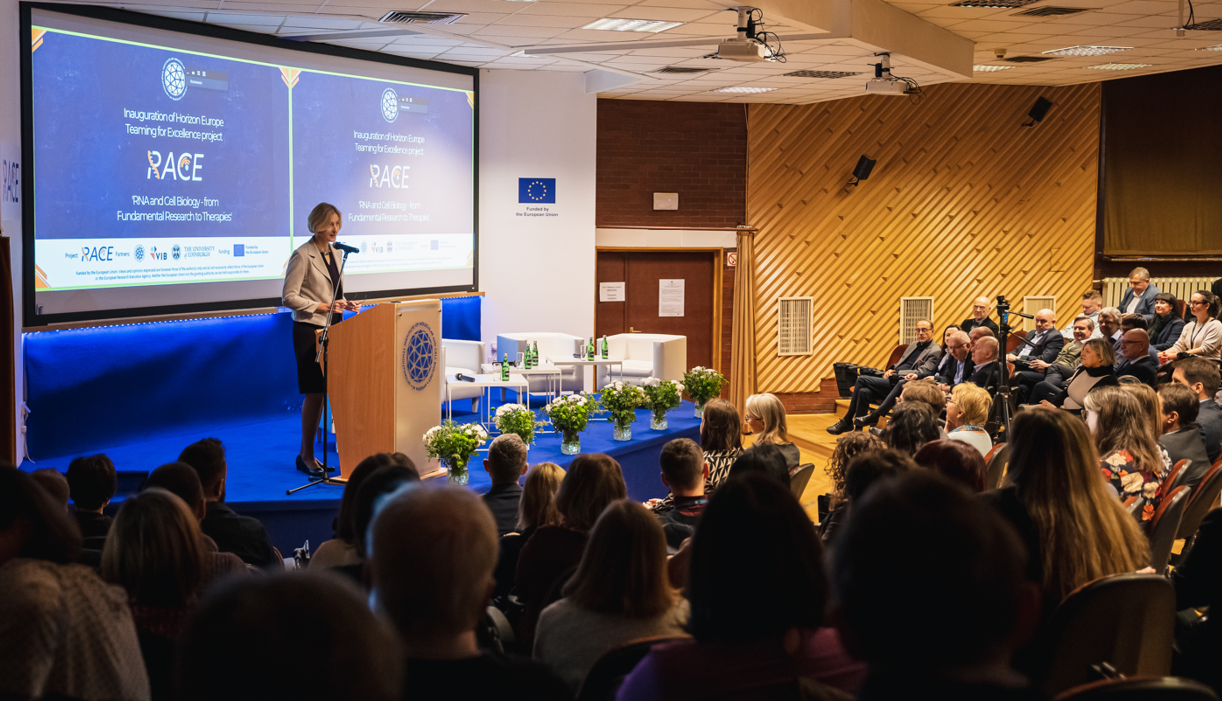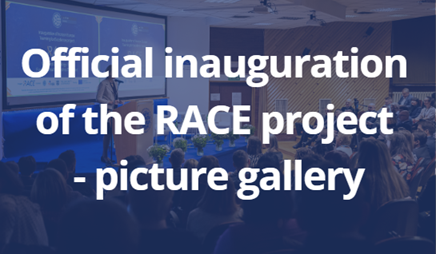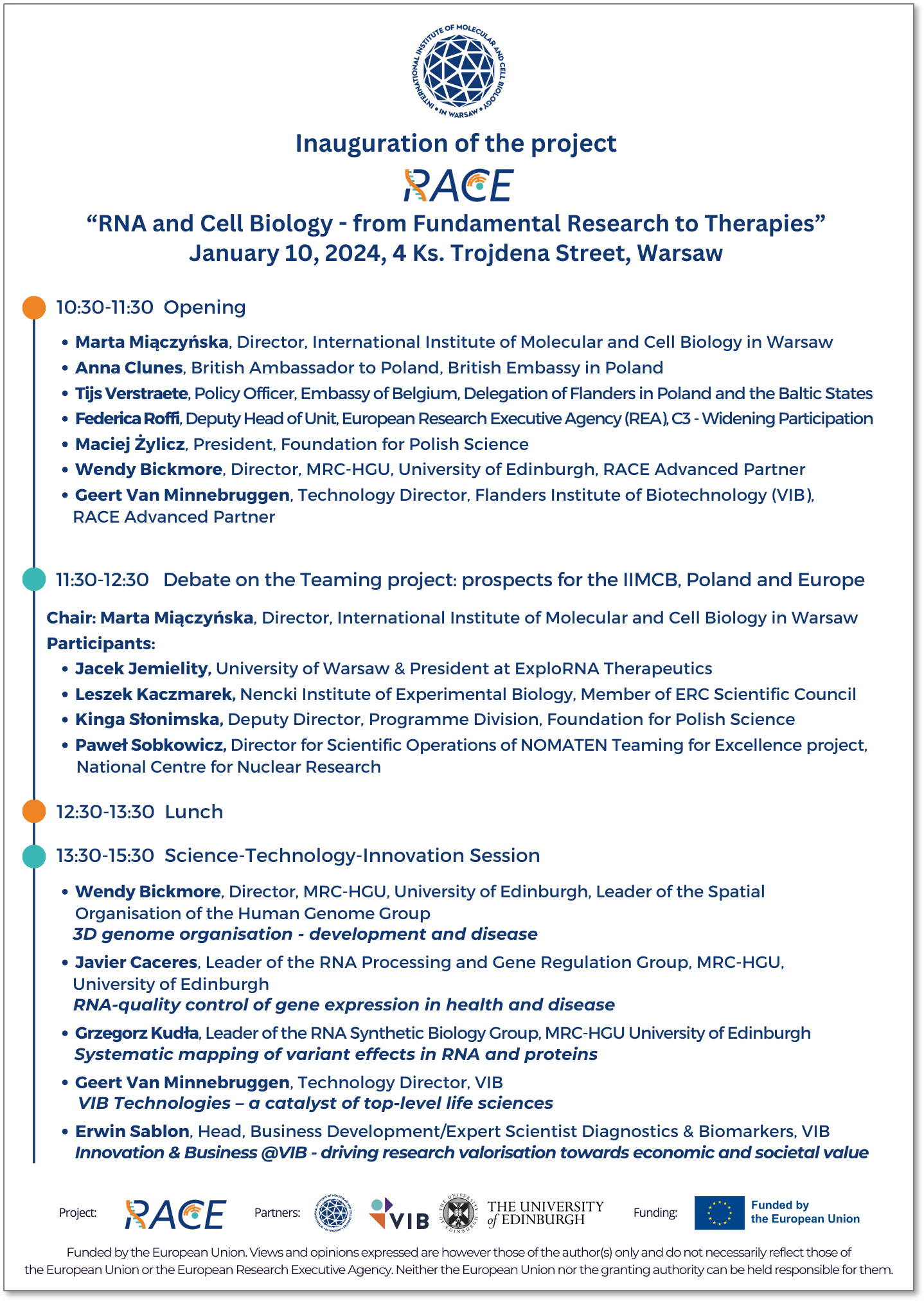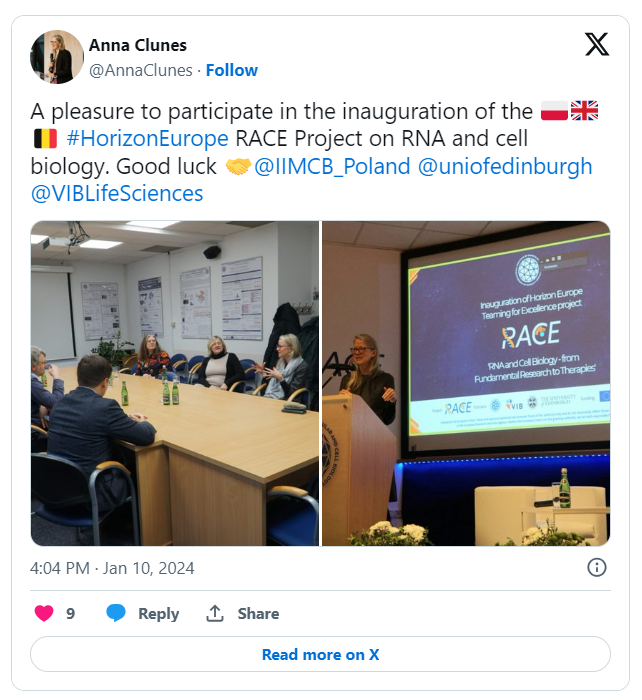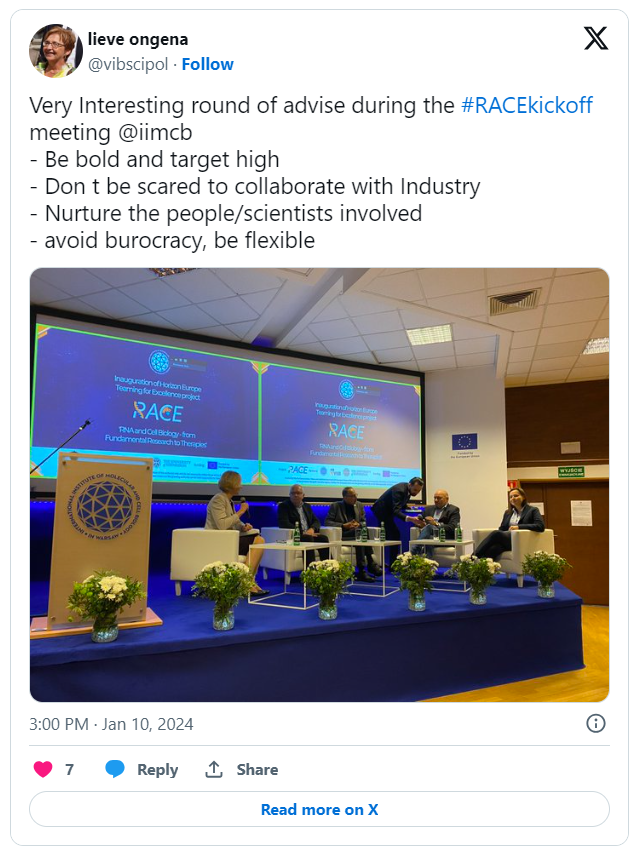From bench to bedside:
the IIMCB begins a new chapter of
its development
The International Institute of Molecular and Cell Biology in Warsaw (IIMCB) has officially inauguratedthe RACE project (an acronym from RNA and Cell Biology – from Fundamental Research to Therapies), aimed at transforming the Institute into a world-class Center of Excellence in the area of RNA and cell biology.
The ceremony, held on January 10, 2024, in Warsaw, was attended by Anna Clunes, the British Ambassador to Poland, Tejs Verstrate, a representative of the Embassy of Belgium, Delegation of Flanders, Michał Olszewski the Deputy Mayor of Warsaw, Prof. Maciej Żylicz, the President of the Foundation for Polish Science, as well as the numerous luminaries of European and Polish science, and the IIMCB community.
The RACE project emphasizes the translational nature of research, meaning the ability to apply scientific knowledge in practice, in line with the principle “from the laboratory bench to the patient's bedside”. There are high hopes for mRNA technology, in which the Warsaw Institute specializes itself. This relatively new therapeutic method has been already used in vaccines against Covid 19. Work is currently underway on its use in the treatment of cancer and infectious diseases.
Additionally, the IIMCB hopes to attract talented scientists who will enable the training of a new generation of scientific leaders and result in numerous patents and grants. The RACE project also envisages the development of commercial services, the development of medical applications based on the IIMCB’s research results, and the digitization of administrative work. The project will have an impact on the development of modern technologies and its results will be realised in the new headquarters of the IIMCB.
As a part of the implementation of the RACE project, the IIMCB will closely cooperate with its partner institutions, namely, the Medical Research Council, Human Genetics Unit of the University of Edinburgh and the Flemish Institute for Biotechnology VIB in Belgium.
Dariusz Wieczorek, the Minister of Science addressed a letter of congratulations to Prof. Marta Miączyńska, the director of the IIMCB. He wrote that through its activities, the IIMCB would be involved in the implementation of strategies for the development of the biotechnology industry in Poland. “This means that we will have a Center of Excellence in the country that will strengthen the resilience of the economy and societyto the threats posed by future potential pandemic crises or diseases. All this leads to the conclusion that the effective implementation of the RACE project will be one of the most significant undertakings on the scientific and innovative map of Poland,” emphasized the Minister of Science.
“We are extremely proud to have obtained funding for the RACE project from the European Commission. Our project was very highly rated and was classified as number one on the European ranking list,” said Prof. Marta Miączyńska, the director of the IIMCB and coordinator of the RACE project. Prof. Miączyńska also expressed appreciation for the Ministry of Science and Higher Education and the Foundation for Polish Science which will provide additional funds for the project.
“In 2020, the United Kingdom was the fifth largest partner of Polish scientific institutions. I hope that we will see more such initiatives in the future,” said Anna Clunes, the British Ambassador to Poland. Her Excellency Anna Clunes noted that, biomedical engineering is one of the key technologies for the United Kingdom. The UK government plans to invest 2 billion pounds in this sector over the next 10 years. “Biomedical engineering has the potential to create individual therapies, and programs such as the RACE project will benefit health in Poland, the United Kingdom, Belgium, and around the world,” said the British Ambassador.
Tejs Verstrate from the Embassy of Belgium to Poland and Lithuania, the representative of the Delegation of Flanders pointed out, that expediture on research and development (R&D) serves to build a knowledge-based society. As he informed, R&D in his country accounts for 3% of GDP and is constantly growing (according to the Polish Central Statistical Office, this indicator was 1.46% in Poland in 2022). The VIB Institute, a partner of the IIMCB, is one of the most innovative centers in Belgiumand has unique experience in building effective cooperation with other institutions. As the Belgian speaker pointed out, over the next 6 years, VIB would work on the RACE project, which would make the IIMCB a world-class center of excellence.
Federica Roffi from the European Research Executive Agency (REA) under the auspices of the European Commission reported that competition for funding under the Horizon Europe program had intensified significantly in recent years. She congratulated the IIMCB for being one the 12 prestigious laureates, out of 115 applications in total. The representative of the European Commission expressed her conviction that the EU support for the RACE project amounting to 15 million EUR would contribute to the development of the IIMCB and strengthen the European cooperation network. “The development of Centers of Excellence is based on several key factors: the highest quality of research and development, adequate funding, analysis of efficiency indicators, independence, and international recruitment,” noted Federica Roffi.
Prof. Maciej Żylicz, the President of the Foundation for Polish Science, addressed the issue of brain drain, i.e., the departure of the most talented scientists abroad. In his opinion, the creation of Centers of Excellence, such as the IIMCB, is the recipe for preventing the outflow of the best scientists. Moreover, it can also attract talent both from within the country and from abroad.
“I am very excited about what we can do together,” said Prof. Wendy Bickmore from the University of Edinburgh. Dr. Geert Van Minnebruggen, representing the Flemish VIB Institute, also emphasized the key role of the cooperation of many entities for the development of science. “We are proud of the collaboration with the IIMCB,” he indicated.
The official part of the event was followed by a debate chaired by Prof. Marta Miączyńska with the participation of scientists from various fields (chemistry, nuclear physics, biology). Kinga Słonimska from the Foundation for Polish Science admitted that attracting talented scientific staff from abroad is difficult but possible. “I would like to see this aspect strengthened. The IIMCB’s cooperation with Edinburgh and the Belgian VIB will certainly attract new scientists,” said the speaker.
Prof. Jacek Jemielity from the University of Warsaw, the President of ExploRNA Therapeutics, pointed out the importance of basic research on RNA. “RNA is a fascinating molecule with therapeutic potential; the potential of this technology is great, but to confirm the technology in other areas, it needs to be developed hence we return to basic research. The RACE project is an investment in basic research,” summarized Prof. Jemielity.
Prof. Leszek Kaczmarek from the Nencki Institute of Experimental Biology of the Polish Academy of Sciences believes that Poland cannot afford to waste the potential of young scientists. Equally important is stable and long-term funding to ensure development and pursuit of excellence. Prof. Paweł Sobkowicz from the National Center for Nuclear Research agreed with him. He said that appropriate funding was essential to stop the outflow of talents and attract young people with potential. – “We all rely on them”, he concluded.


